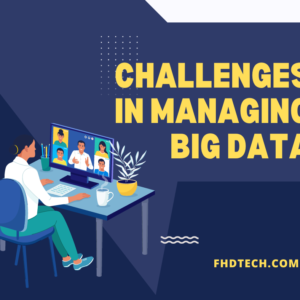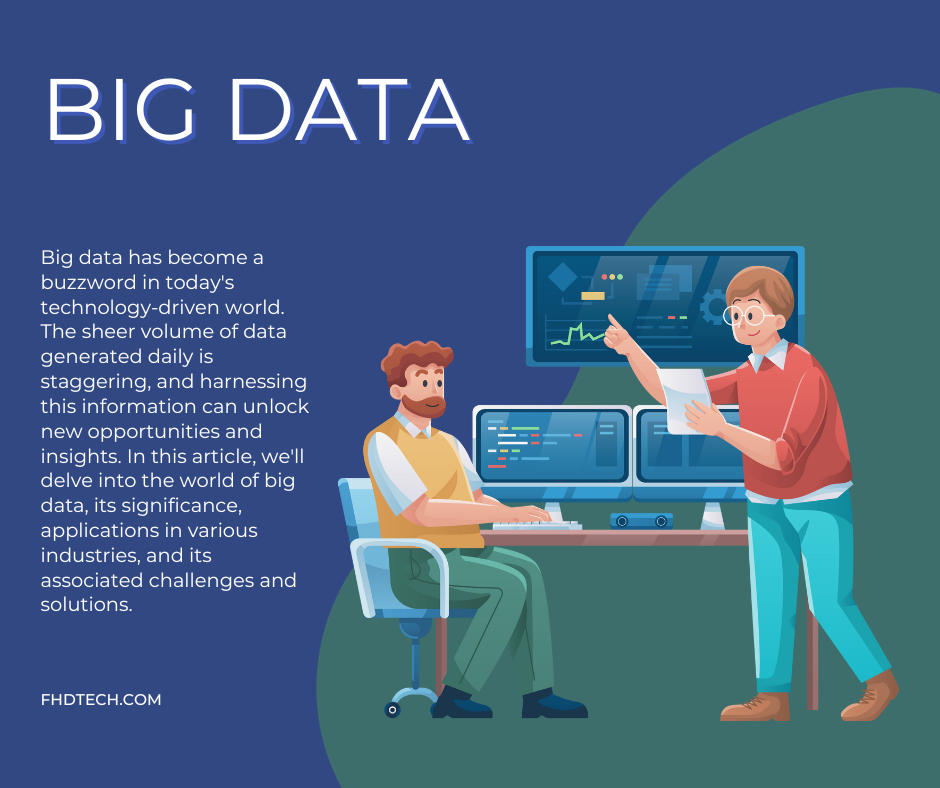Big Data: Transforming the World of Information
Big data has become a buzzword in today’s technology-driven world. The sheer volume of data generated daily is staggering, and harnessing this information can unlock new opportunities and insights. In this article, we’ll delve into the world of big data, its significance, applications in various industries, and its associated challenges and solutions.

Introduction to Big Data
Big data refers to the vast and complex datasets generated daily through various sources, including social media, IoT devices, online transactions, and more. This data is characterized by its three V’s – Volume, Velocity, and Variety.
The Significance of Big Data
The ability to collect and analyze big data has revolutionized decision-making processes across industries. Businesses and organizations can gain a competitive edge by making data-driven decisions.
Big Data in Various Industries
Healthcare
In the healthcare sector, big data is used for predictive analytics, disease tracking, and patient records management. It has improved patient care, reduced costs, and aided medical research.
Finance
Financial institutions use big data for fraud detection, risk assessment, and customer insights. It helps them identify market trends and optimize investment strategies.
E-commerce
Online retailers utilize big data to personalize recommendations, analyze user behavior, and enhance the customer shopping experience.

Challenges in Managing Big Data
Big data has challenges, including storage, processing speed, and quality. These challenges have led to the development of powerful tools and technologies.
Tools and Technologies for Big Data
Hadoop
Hadoop is an open-source framework that facilitates processing large datasets in a distributed computing environment. It’s widely used for storing and processing big data.
Apache Spark
Apache Spark is another powerful tool that provides lightning-fast data processing. It’s known for its in-memory processing capabilities.
The Role of Machine Learning in Big Data
Machine learning plays a vital role in big data analytics by enabling algorithms to learn and predict data patterns. It’s the backbone of many data-driven applications.
Data Privacy and Security Concerns
With great data comes great responsibility. Privacy and security concerns are paramount when dealing with big data. It’s essential to ensure data protection and adhere to regulations.
Real-Life Use Cases of Big Data
Big data is not just a theoretical concept; it’s making a difference in the real world. Examples include predicting disease outbreaks, optimizing supply chains, and enhancing customer experiences.
Benefits of Big Data Analytics
Big data analytics empowers organizations to gain insights, optimize operations, and innovate. It provides a competitive advantage by identifying opportunities and risks.
Future Trends in Big Data
The future of big data holds exciting possibilities. It includes advancements in data processing, AI integration, and even more extensive use of big data in areas like climate change and smart cities.
Conclusion
In conclusion, big data is more than a technological trend; it’s a transformative force reshaping industries, driving innovation, and improving decision-making processes. It’s a valuable resource that, when harnessed properly, can lead to significant advancements.
FAQs
1. What is the primary challenge in dealing with big data?
The primary challenge is managing the sheer volume, velocity, and variety of data generated.
2. How is big data used in healthcare?
Big data is used in healthcare for predictive analytics, disease tracking, and patient record management.
3. What tools are commonly used for big data processing?
Hadoop and Apache Spark are widely used tools for big data processing.
4. What is the significance of machine learning in big data analytics?
Machine learning enables algorithms to learn and predict from data patterns, enhancing data analysis.
5. What are the future trends in the field of big data?
The future of big data includes advancements in data processing, AI integration, and extensive use in areas like climate change and smart cities.













Leave a Comment